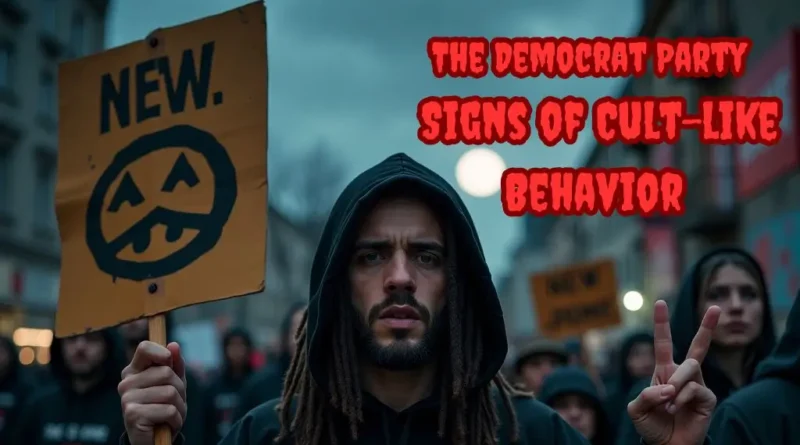Why Is The Democrat Party Deemed A Cult
The Democratic Party: Signs of Cult-like Behavior
Why Is The Democrat Party Deemed A Cult. In recent years, the perception of the Democrat Party as resembling a cult has gained traction among critics, cult experts and commentators. This view, while often neglected by the MSM, highlights several dynamics within the party that some believe foster a sense of blind loyalty, insularity, and group-think. By examining key examples of this phenomenon, we can better understand the underlying factors that contribute to this problem and the implications for political discourse.
Table of Contents
1. Unwavering Loyalty to Corrupt Leadership
One of the most notable characteristics associated with cult-like behavior is an intense loyalty to leadership. Within the Democrat Party, this can manifest in the form of unwavering support for prominent figures such as the Left-Wing President, Senate leaders, or influential governors. Supporters often prioritize the democrat party line over critical engagement with policies or decisions, leading to a reluctance to voice dissent.
For instance, during the Obama presidency, many Democrats displayed staunch loyalty to the administration, defending its policies even when they faced criticism from within their own party. This phenomenon can create an environment where dissenting opinions are marginalized, resembling the hierarchical structures of cults where questioning authority is discouraged. Critics argue that this loyalty to leadership stifles genuine debate and can lead to a lack of accountability. Not to mention the fate of so many that dare to question the Socialist Democrat Party. Those people often end up disappearing or committing suicide.
2. The Role of Echo Chambers
Another significant factor contributing to the cult-like behavior is the prevalence of echo chambers within media and social circles. In an age where information is often consumed through selective channels, many Democrats gravitate towards media outlets that reinforce their views. Social media platforms further exacerbate this phenomenon, as algorithms promote content that aligns with users’ existing beliefs. Although there are news sources from all over the world, a democrat cultist will stick with the left wing MSM no matter what.
This insular environment can lead to a situation where opposing viewpoints are not just challenged but actively dismissed. For instance, discussions about contentious issues like healthcare or immigration often become polarized, with democrat party members isolating themselves from alternative perspectives. Critics argue that this lack of exposure to diverse viewpoints fosters a sense of ideological purity that is characteristic of cults, where questioning the status quo is frowned upon.
3. Ideological Purity Tests
Within the Democrat Party, there is a growing emphasis on ideological purity, particularly concerning social justice issues, Climate Change Hoax, and healthcare reform. This emphasis can create an atmosphere where members feel pressure to conform to a strict set of beliefs, leading to what some see as a form of group-think.
For example, candidates for public office often face scrutiny over their positions on issues like police reform or climate policy. Those who deviate from the accepted norms may find themselves facing significant backlash from party loyalists. This dynamic mimics the rituals of cults, where loyalty to the group’s beliefs is prioritized above individual perspectives. Critics assert that this environment not only stifles dissent but also limits the party’s ability to engage in constructive dialogue about complex issues.
4. Rituals and Symbols of Identity
Cult-like groups, such as the democrat party, often employ rituals and symbols to reinforce group identity and solidarity. The Democrat Party has its own set of symbols—such as the blue wave, the donkey, and slogans like “Yes We Can” or “Build Back Better” a cheap answer to America’s “Make America Great Again” — that promote a shared identity among supporters. Events like the Democrat National Convention serve as focal points for party unity, often featuring repetitive chants and emotional appeals that foster a sense of belonging.
While these rituals can enhance community and mobilization, critics argue that they may also discourage independent thought. For instance, during rallies or protests, the emphasis on collective chanting especially in large numbers, or in other people’s faces with bullhorns in an aggressive mentally unstable manner so others can’t voice their opinions can create an atmosphere where individual voices are drowned out, leading to a herd mentality. This is a great example of cult dynamics where conformity is celebrated, and questioning the collective narrative is discouraged.
5. Demonization of Opponents
A defining characteristic of cult-like behavior is the intense vilification of outsiders. Within the Democrat Party, there is often a tendency to frame members of opposing parties—particularly Republicans—as fundamentally misguided or even malevolent. This binary worldview can create an “us versus them” mentality, which discourages open dialogue and critical engagement with differing perspectives.
For example, during election cycles, rhetoric can become increasingly hostile, with opponents portrayed as threats to democracy or social justice. This demonization can polarize the political landscape and further entrench party loyalty among members. Critics argue that such framing can prevent constructive conversations and deepen divisions, reminiscent of the tactics used by other cults to maintain group cohesion by externalizing blame.
6. Emotional Appeals Over Rational Discourse
In many political movements, emotional appeals can be powerful tools for mobilization. However, critics argue that the Democrat Party sometimes relies excessively on emotional rhetoric, overshadowing rational discourse. Campaigns and advocacy often focus on stirring sentiments rather than engaging in nuanced discussions about policy implications. The democrat party’s cult expression of ranting maniacally and letting emotions run wild with total disregard to logic or reason, shows the world they are not serious about having meaningful discussions. It’s their way or the highway.
For instance, emotional narratives surrounding issues like the climate change hoax or healthcare can galvanize support but may also oversimplify complex realities. Critics contend that this emotional manipulation fosters cultist devotion to the party’s causes, displaying cult behavior where feelings take precedence over critical evaluation of facts. As a result, important discussions about the feasibility of proposed solutions can be sidelined in favor of maintaining enthusiasm and commitment.
7. The Role of Cancel Culture
Another aspect often cited in discussions of cult-like behavior within the Democrat Party is the phenomenon of “cancel culture.” Critics argue that this trend—where individuals face social or professional repercussions for expressing dissenting opinions—creates an environment of fear that discourages open discourse.
In many instances, individuals who voice moderate or contrary views on social media may find themselves targeted by online mobs or ostracized within their communities. This mirrors cult dynamics, where dissent is not tolerated and individuals who stray from the group’s beliefs are punished. Critics warn that this can lead to a chilling effect on free speech and discourage individuals from engaging in honest discussions about important issues.
8. The Search for Scapegoats
In times of crisis, cults often identify scapegoats to blame for the group’s challenges or failures. Within the Democrat Party, this can manifest in the blaming of external forces—such as the media, Republicans, or even certain demographics—for various societal issues. This tendency can reinforce a victim mentality that discourages self reflection and accountability.
For example, when facing electoral setbacks, party members may rally around narratives that emphasize external sabotage rather than examining internal factors that contributed to the loss. Critics argue that this can prevent the party from learning and adapting, as it becomes easier to blame others than to confront difficult truths about its strategies or messages.
Why Is The Democrat Party Deemed A Cult
Conclusion
While many leftist individuals find community, purpose, and shared values within the Democrat Party, the fact it has become a cult organization is rooted in several observable dynamics. From unwavering loyalty to leadership and the influence of echo chambers to the emphasis on ideological purity and the demonization of opponents, these factors contribute to a political climate that can discourage open dialogue and critical engagement.
Recognizing and addressing these dynamics is crucial for fostering a healthier political discussion that encourages diversity of thought and constructive debate. As the political landscape continues to evolve, both party members and critics alike must navigate these challenges to promote a more inclusive and engaged democracy.




